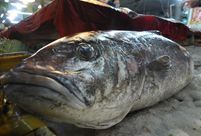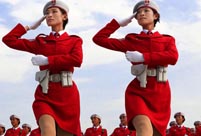 Bikini show in 2014 China Final of Miss Tourism World
Bikini show in 2014 China Final of Miss Tourism World
 Close-up view of August Aerobatic Team
Close-up view of August Aerobatic Team
 Goddesses married in 2014
Goddesses married in 2014
 Polar region photos raise worldwide awareness of global warming
Polar region photos raise worldwide awareness of global warming
 Get off at the last stop — Beijing Subway in vision
Get off at the last stop — Beijing Subway in vision
 Top 100 beauties in the world!
Top 100 beauties in the world!
 Gallery: Who is the most beautiful one?
Gallery: Who is the most beautiful one?
 If you like autumn, put your hands in the air!
If you like autumn, put your hands in the air!
 Fan Bingbing's "Queen style" in new play
Fan Bingbing's "Queen style" in new play
 Lingerie show at 2014 Miss China
Lingerie show at 2014 Miss China
People who do ask such questions are generally told that Hong Kong is Britain’s business because Hong Kong used to be British, and because China signed a handover agreement with Britain in 1997. Rarely, if ever, do their interlocutors seem to trouble themselves with the obvious follow-up question: “How did an island one mile off the Chinese coastline, and a piece of the adjacent Chinese mainland, ever become ‘British’ to start with?”
The general British attitude to China could best be summed up as “a big bag of arrogance, stuffed to the brim with ignorance, and tied at the neck with prejudice”. This is partly because nothing at all is ever taught to pupils in British schools about the history of Britain’s involvement in China from the mid-19th century onwards. They learn a lot about the slave trade.
The least ignorant, asked how Hong Kong became British, tend to mumble something along the lines of: “A lease… there was a lease. Wasn’t it?”
The facts are these: Hong Kong Island was seized and occupied by Britain in January 1841, during the First Opium War. It was subsequently annexed and declared to be “Crown territory in perpetuity”. It was not until much later, having realised that the island lacked the resources to be self-sufficient, that Britain decided to ‘lease’ Kowloon Tong and the New Territories, which lie on the Chinese mainland. The negotiations surrounding that lease could best be characterised as:“Hi there, China. Remember that bullet we put in your knee over Hong Kong Island? Well you have another knee, and we have another bullet. Sign here.”
That is how Hong Kong became ‘British’.
“Yes yes yes,” I hear you splutter. “But that was a hundred and fifty years ago. Surely the Chinese aren’t still going on about that…”
Well, if you think about things for a micro second or two, it might occur to you that one of the reasons that China is ‘still going on about that’ is that from a Chinese perspective the Opium Wars ended not in the middle of the 19th century, but in 1997, when Britain finally deigned to return the territory it had stolen.
And one of the other reasons is that the Opium Wars were not some minor skirmish, in which a few lives might have been lost, and which does not reflect very well on the Britain of that era…
The Opium Wars were the start of more than a hundred years of appalling brutality inflicted upon China by every single country that had the technology to get its gunboats into Chinese waters and its troops onto Chinese land. On the subject of which our schoolchildren are taught nothing.
It is true that Britain did not act alone. The “Eight-Nation Alliance” that put down the Boxer Rebellion in 1900 comprised forces from America, France, Germany, Italy, Austria, Russia and Japan as well as Britain. But it was unarguably Britain that first introduced the idea to the rest of the world that China was an international grab-bag, open to any country that felt disposed to a bit of war mongering and pillage. And Britain continued to play its unsavoury role right into the 20th century.
As far as I can ascertain, the last occasion on which British troops on the Chinese mainland took it upon themselves to shoot down and kill unarmed Chinese demonstrators - people who were protesting against the British presence in their country - was on 30 May 1925 in Shanghai. In February 1931 it was British police who handed over a group of Chinese political activists to the Kuomintang, to be tortured and murdered. The 18 who were killed included a number of women, and five members of the League of Left-Wing Writers. When their bodies were recovered, it was apparent that some had been buried alive.
As they pronounce on the rights of humanity, the image of our British politicians must seem to them to be that of a gathering of great sages, handing down tablets of ancient wisdom to their inferiors from the lofty heights of Mount Moral Superiority. Is it really surprising that they appear to much of the rest of the world as scrawny fowl, squawking incoherently from the top of a barnyard dung heap?
 |  |
 Unknown 'monster' fish caught in Shandong
Unknown 'monster' fish caught in Shandong 20 years on: Relocated Three Gorges residents through lens
20 years on: Relocated Three Gorges residents through lens PLA HK Garrison veterans leave behind beautiful smiles
PLA HK Garrison veterans leave behind beautiful smiles Chestnut girl goes viral online
Chestnut girl goes viral online Beautiful Chinese woman
Beautiful Chinese woman Representative beauties
Representative beauties Victoria's Secret Fashion Show
Victoria's Secret Fashion Show Excellent photos of Zhuhai Air Show
Excellent photos of Zhuhai Air Show In photos: Bright and brave female soldier of PLA
In photos: Bright and brave female soldier of PLA Blood and terror
Blood and terror China needs clear strategy to help Russia
China needs clear strategy to help Russia Beijing grapples with overflowing garbage problems
Beijing grapples with overflowing garbage problems A roundup of some of the key phrases and events of 2014
A roundup of some of the key phrases and events of 2014Day|Week|Month